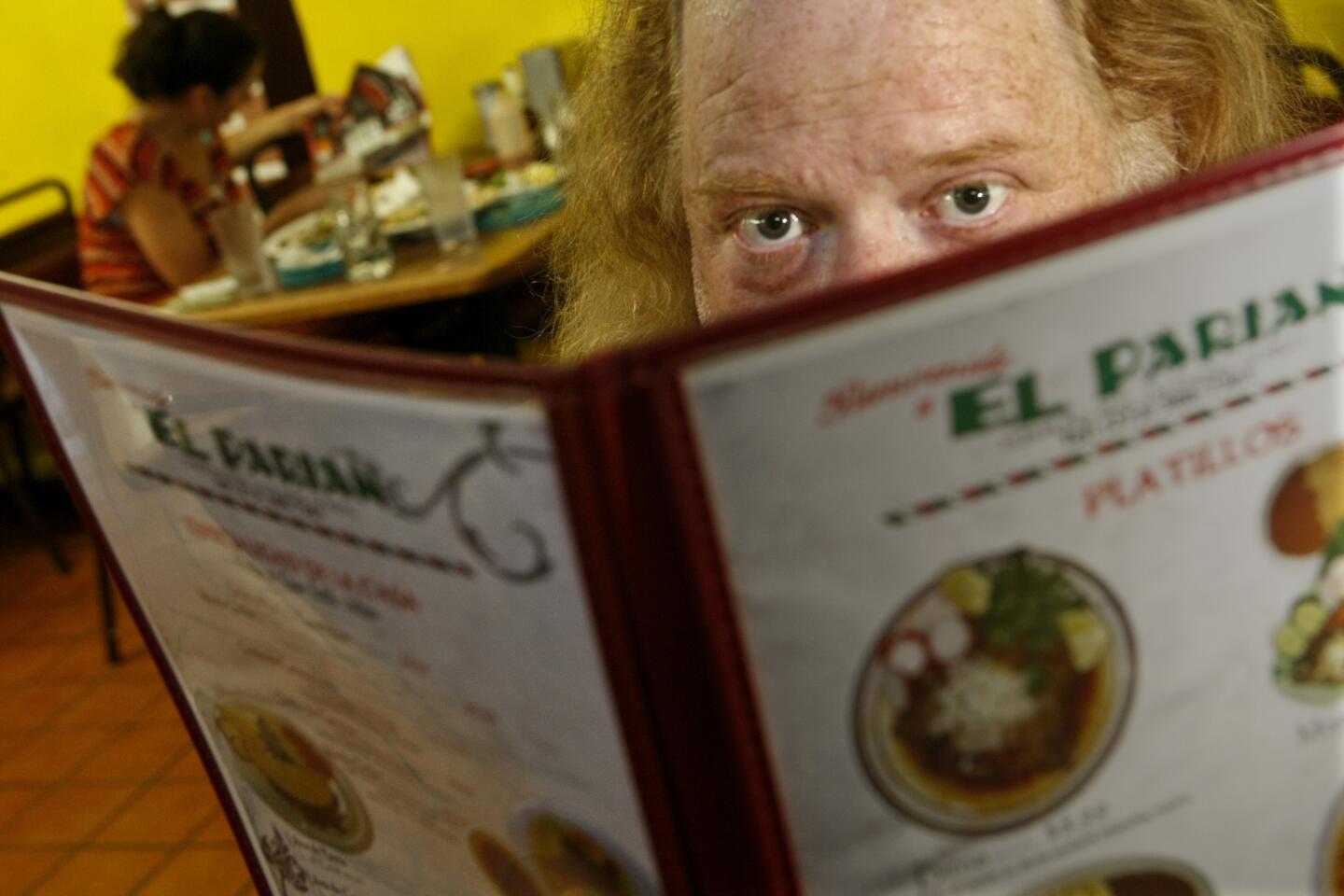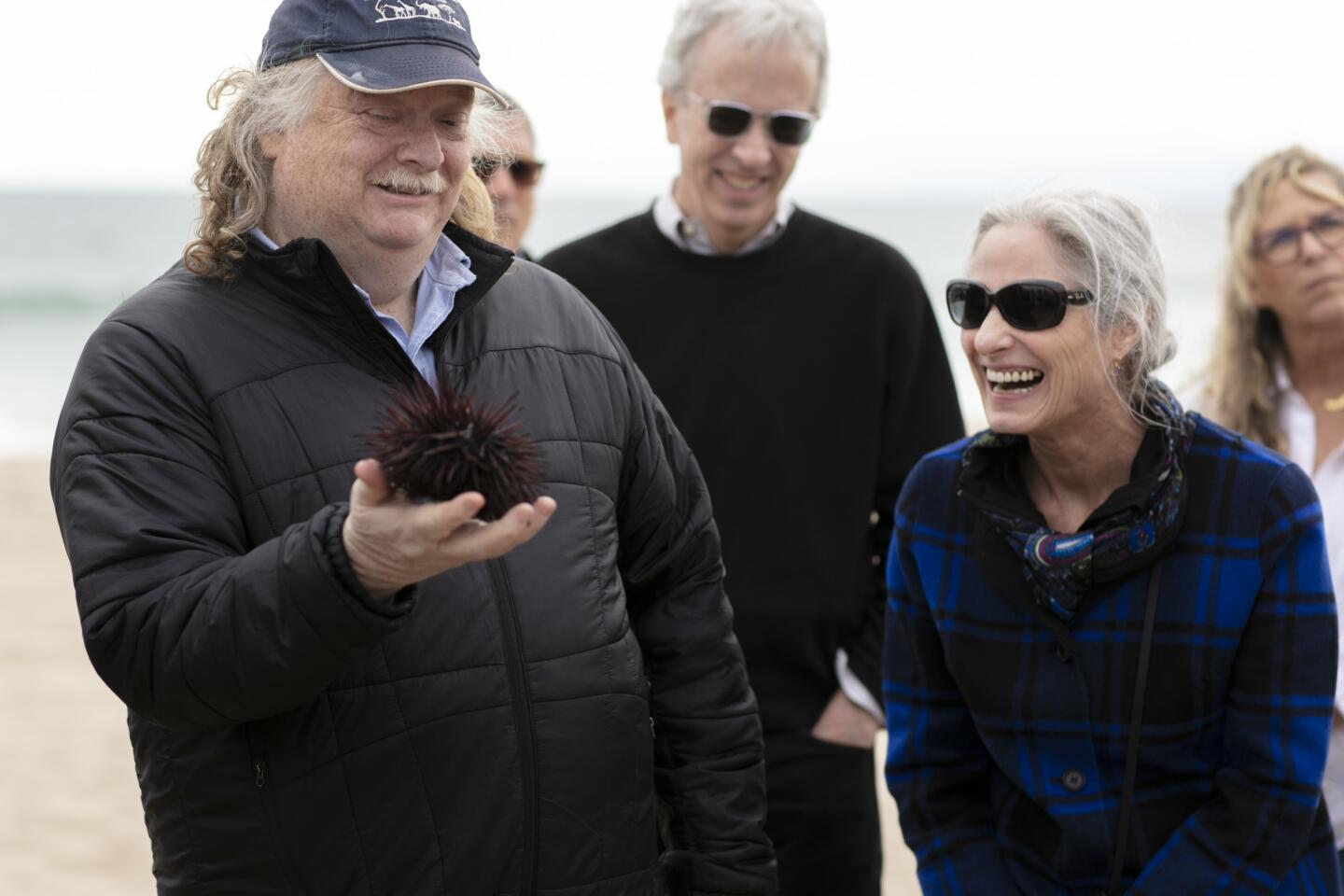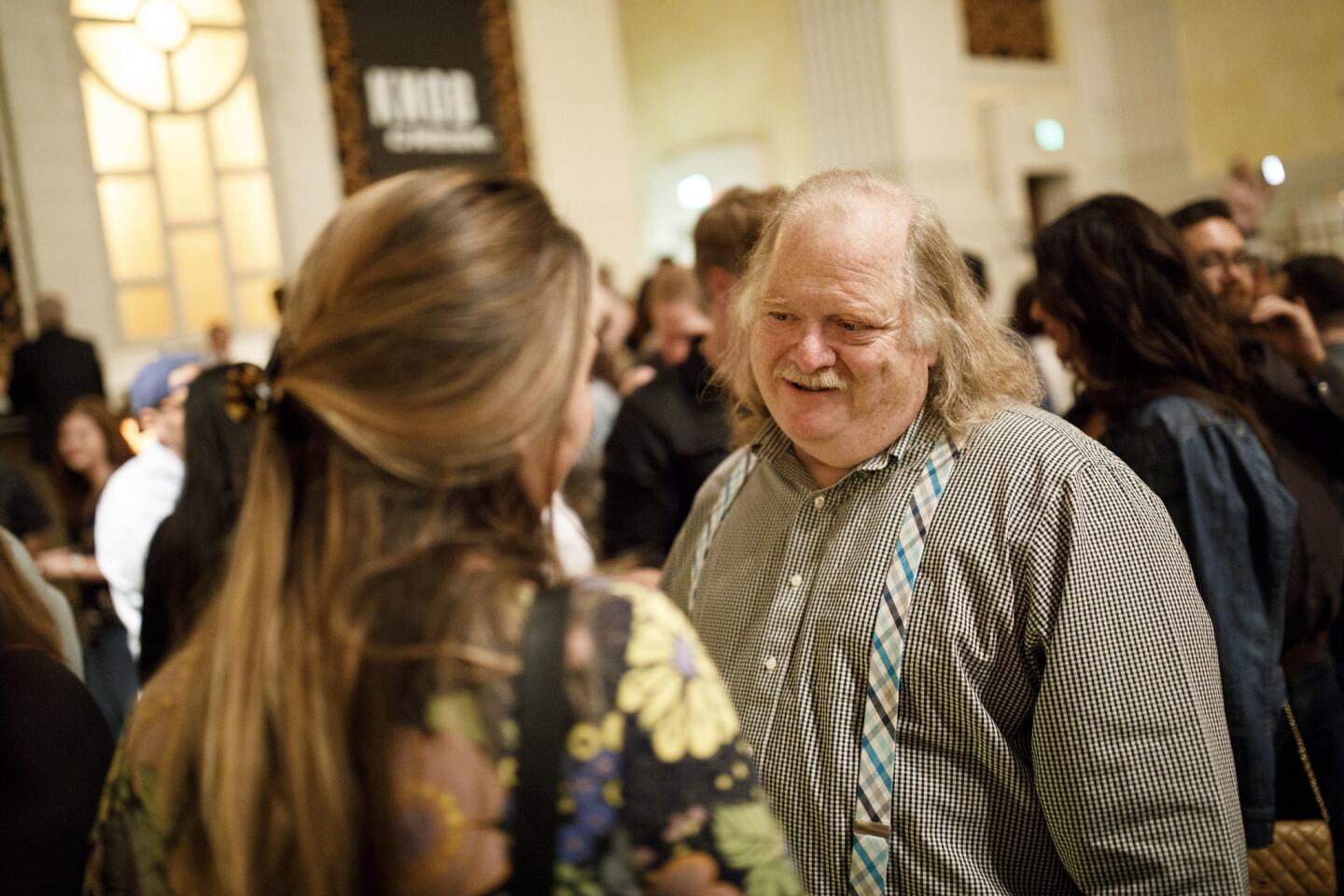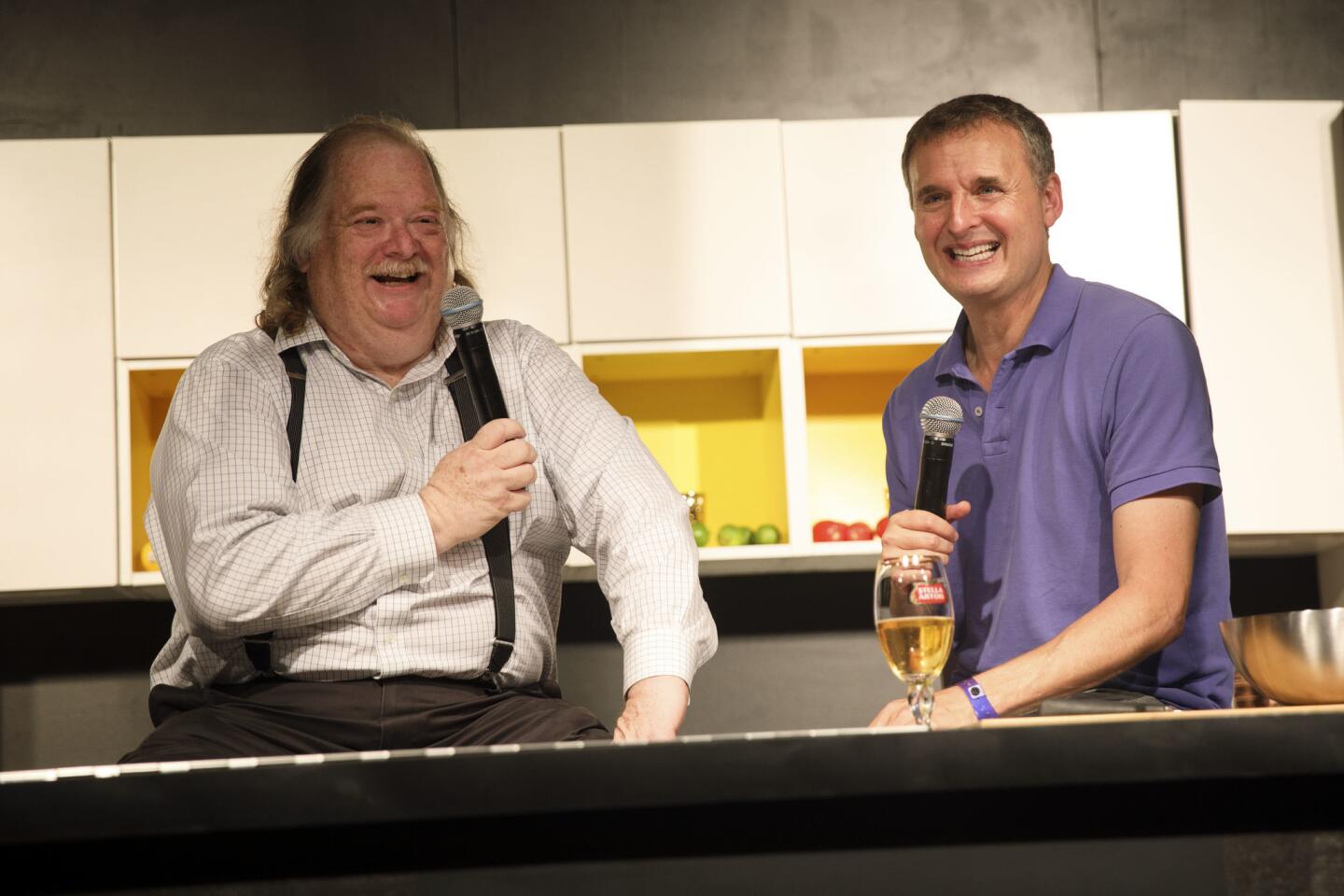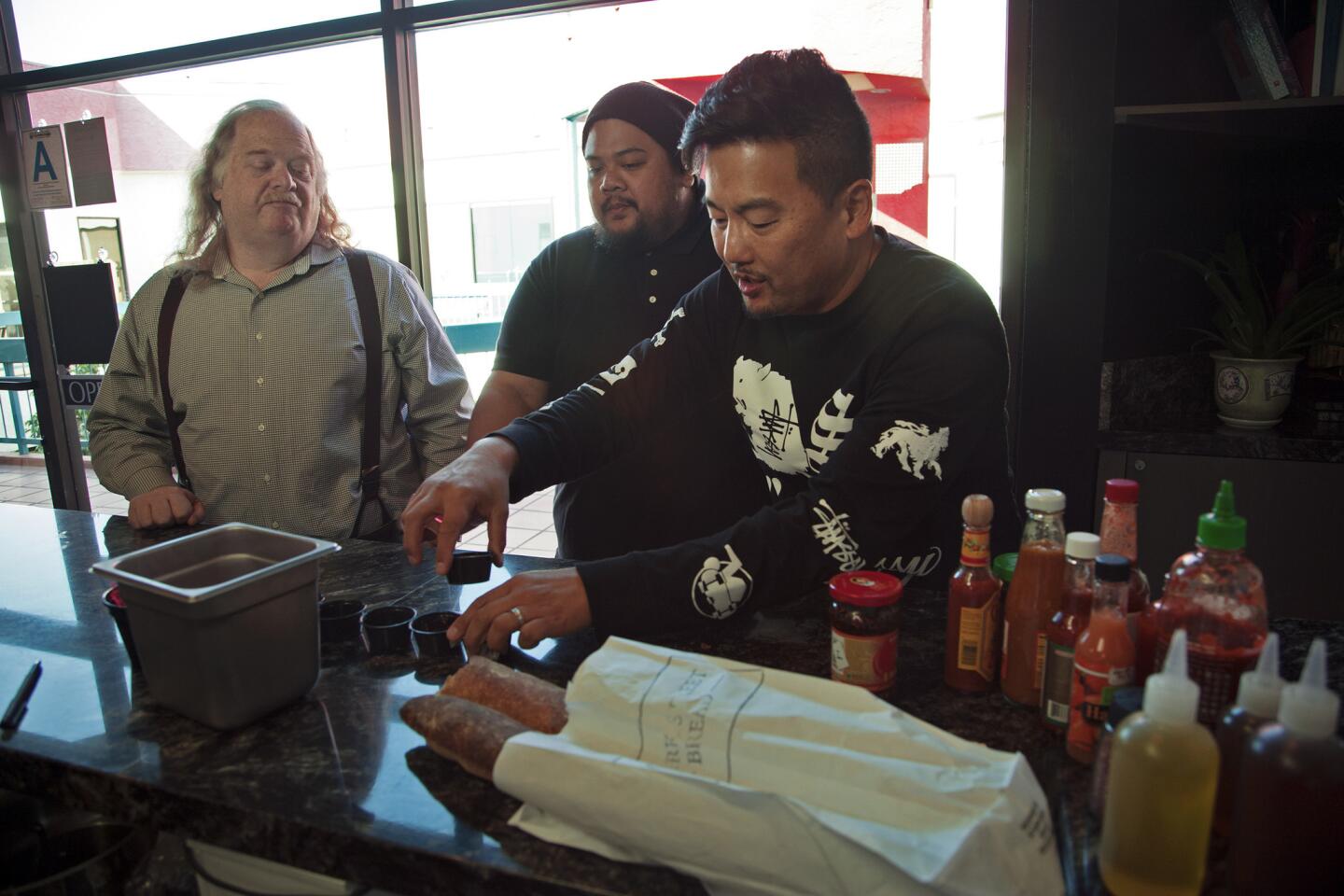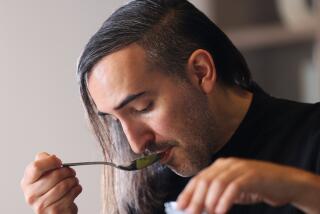Column: Jonathan Gold didn’t just elevate the art of food writing and restaurant criticism, he helped a fractured region understand itself
Few things truly connect our sprawling metropolis: the freeways, The Times and without a doubt, Jonathan Gold, who transcended the role of restaurant critic to become a modern-day ethnographer. His gift was his ability to explain the tribes of this place to each other by celebrating the things they cook and eat.
“Real life occurs, of course, in the parts of town where guys at the gas station speak Korean and where the streets intersect at 90-degree angles to one another, and where the possibilities are as infinite as the extended coastal plain,” he wrote in The Times’ Sunday magazine in 1993.
For the record:
12:00 a.m. July 23, 2018A previous version of this column said a Jonathan Gold essay appeared in The Times’ Sunday magazine in 1990. It ran in 1993.
Bite by bite, Jonathan, who died Saturday at 57, tasted the infinite possibilities of this extended coastal plain. His love for exploring the region behind the wheel of his truck was almost as intense as his love for eating.
“I am fond of driving long distances on surface streets,” he wrote in that 1993 essay, “coursing down the 40-mile length of Rosemead Boulevard from Pasadena until it disappears into a traffic circle deep in Long Beach, cruising down Slauson from the Marina to Whittier, or up the old Sierra Highway toward Lancaster, passing endless low stucco buildings and hundreds of tiny malls, mom ’n’ pop truck stops and original-issue diners, 24-hour steakhouses and blinking neon drive-ins, seedy cantinas waiting for a fistfight to break out, ethnic enclaves strung along the boulevards like colorful beads on taut skeins of thread.”
Reading him, you could learn as much about Los Angeles’ immigrant communities as you could about food. In 2012, for the 20th anniversary of the L.A. riots, Jonathan reflected on how the upheaval had affected restaurant life. He started with a paean to his old neighborhood, Koreatown:
“The neighborhood — the diversity of the neighborhood — may have been what drove me to write about food in the first place. Immediately before the riots there had been restaurants from 14 regions within a few minutes’ walk from my apartment. Not just the Korean, Mexican and Japanese places you might have expected, but restaurants from Sumatra, Thailand, Guatemala, Pakistan, Bangladesh, Holland, Colombia, Nicaragua, Japan and Peru among others — all coexisting, all more or less delicious. It’s one thing to decide whether you feel like burgers or pizza for dinner; another to choose between bangus, empek-empek or brains masala.”
Until I began reading Jonathan, I knew nothing of the San Gabriel Valley’s Hong Kong seafood scene. I gave little thought to birria — the savory goat stew of Central Mexico — until I read Jonathan’s take on a restaurant called El Parian in L.A.’s Pico-Union neighborhood. I could not have defined “congee” until he extolled its virtues in a 2014 review of the Hollywood pop-up restaurant Porridge and Puffs.
“It is easy to laugh at the idea of a porridge-intensive restaurant,” he wrote, “until you taste a spoonful of the rice porridge with pickles and jam: an arrangement of herbs, fermented mustard greens and a spoonful of a sharp, lemongrass-infused chile condiment as dazzling in its complexity as anything coming out of the most famous kitchens in town.”
Jonathan was an unusually generous critic. He could make a restaurant but he would never break one.
Unlike so many restaurant critics who seemed to derive pleasure from composing the clever and quotable put-down (as, for instance, New York Times critic Pete Wells, who infamously compared the soup at Manhattan’s high-end Per Se to “bong water”), Jonathan was never unkind.
This empathy did not lessen his impact as a critic; on the contrary, it conferred a kind of superlegitimacy on him, as chefs knew that he knew what they were trying to do, even when they fell short.
“Jonathan appreciated having fans,” said Alice Short, a former Times assistant managing editor who edited Jonathan after he returned to the paper in 2012, “but his real love affair was with the people who cooked.”
In May, Alice attended one of The Times’ Food Bowl dinners at restaurateur Sang Yoon’s (of Lukshon and Father’s Office) test kitchen in Culver City, which included a conversation between Jonathan and the chef. “They brought out the best in each other,” Alice said. “Jonathan was very familiar with what the chef did, and the chef was familiar with what Jonathan was doing.”
Jonathan and I were colleagues, on and off, for almost 30 years. We did not know each other well and never socialized, but I, like so many other food-loving Angelenos, watched with fascination as his career blossomed.
He bounced around a bit — his writing career began at the L.A. Weekly (where he would win his Pulitzer Prize in 2007). In the 1990s, in his first stint with The Times, he brought with him the “Counter Intelligence” column he’d started at the Weekly, about unsung restaurants in unglamorous parts of town.
He also was part of a trio of columnists — Patt Morrison and the late Wanda Coleman — who took turns writing a column called “Three on the Town” for The Times magazine. His food columns were always personal, but these pieces were even more intimate.
He wrote of spending too much time at the Los Angeles Zoo, of proposing to his wife in front of the meerkat enclosure. He wrote about his frustrated career in punk rock. His high-minded takes on pop culture sometimes came across as a hipper-than-thou pose, but the plain truth is that he was the hippest guy in the room. It was no pose.
Tell us how Jonathan Gold shaped your L.A. experience »
Years later, thanks to his extraordinary range and the first Pulitzer Prize awarded to a food critic, Jonathan became a god in the food world. That would have been burden enough, but he also became a linchpin of the L.A. Times’ survival plan for the digital age, headlining splashy annual food events like The Taste and putting out the annual “Jonathan Gold’s 101 Best Restaurants” guide. It may not have been fair to put so much pressure on a single journalist — albeit a spectacularly talented one — but he was The Times’ marquee name.
Through Alice, I came to appreciate both Jonathan’s astonishing intellect and his almost pathological difficulty with deadlines.
“I don’t think his writing came easy,” Alice told me Friday when we learned he was close to death. “If he was late, it was not like he was sitting around twiddling his thumbs. He was trying to write something important every time.”
::
I say this with admiration: Jonathan could be weird, very weird. He once aspired to be a performance artist. A naked performance artist.
In an interview with “This American Life” host Ira Glass, he reminisced about the time he rented a warehouse in West Los Angeles for a performance piece. He scattered dead chickens around the floor, then tethered to his waist a live chicken he’d gotten at a Chinese market. He and the hen were separated by three feet of rope. He blindfolded himself and wildly swung a machete for 10 minutes until he was spent. Miraculously, the chicken survived.
Jonathan cleaned up the mess and took the chicken home, where it lived on the top of his refrigerator for six months, eating Green Giant canned corn. While the hen watched from the fridge, Jonathan tried out hundreds of chicken recipes.
This story prompted Jonathan to share a second story that illustrated his willingness to go to shocking culinary extremes, not just for the love of food but for metaphysical reasons.
As Jonathan relayed it to Glass, after a mediocre meal at a Korean restaurant called Living Fish Center, he realized that he had overlooked the house specialty. He ordered it. The chef, Jonathan said, reached into a tank full of live prawns, plucked one out, removed its exoskeleton and served it.
“The head was intact and the tail was still on,” Jonathan told Glass, “but the middle part was naked like a grub. I picked up this prawn with my chopsticks … it was extremely alive and it was wiggling its legs and it was wiggling its antennas and its eyes were swiveling madly on its eyestalks, and it was looking back at me seeing me as actually the predator, the creature that was going to eat it. … I don’t think I want to do that again.”
Glass wondered whether eating a living creature somehow made the mundane act of eating “sacred.”
“One of the greatest metaphors of Western civilization is that of Christ who gave his life so others might live,” Jonathan replied. “I don’t want to be sacrilegious or belittle that myth in any way. But a pig is giving its life so that we might live. ... The least we can do is think about that chicken, about that calf we are eating, not necessarily to be sad for it, but to celebrate it.”
One of his last pieces for The Times was the quintessential Jonathan Gold story: what to eat while watching the Mexico vs. South Korea World Cup match.
“The Los Angeles area is home to the second-largest Mexican community in the world, second only to Mexico City,” he wrote. “It is also home to the largest Korean community outside Korea. As Angelenos, most of us have spent a fair amount of time in Mexican restaurants. We eat a lot of Korean food too. At Roy Choi’s Kogi trucks, and at the imitators of the Kogi trucks, we eat a lot of Korean-Mexican food too — kimchi quesadillas and hot dogs with sesame mayo, but mostly the tacos stuffed with things like galbi or gochujang-sluiced chicken and condiments that neatly split the difference between panchan and salsa bar.
“It tastes like Mexico! It tastes like Korea! It tastes like Los Angeles!”
I can imagine no better swan song from Jonathan Gold, whose curiosity, taste buds and virtuosic prose have come to define our region — and make us all feel part of the same wondrous cultural kaleidoscope — as no writer has ever done.
View all our coverage of Jonathan Gold | 1960 – 2018 »
More to Read
Start your day right
Sign up for Essential California for the L.A. Times biggest news, features and recommendations in your inbox six days a week.
You may occasionally receive promotional content from the Los Angeles Times.
